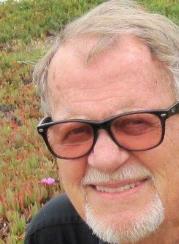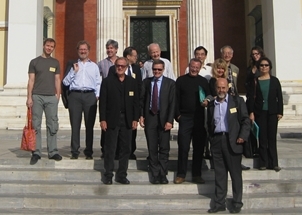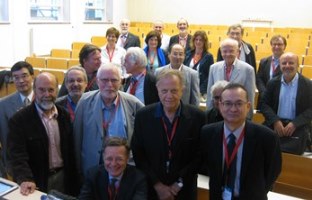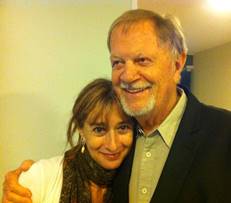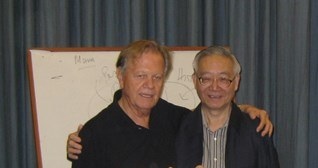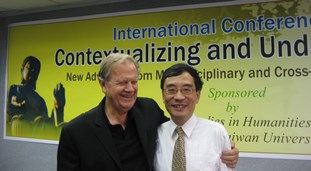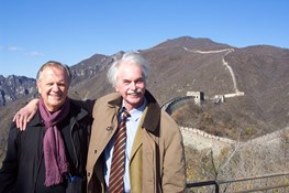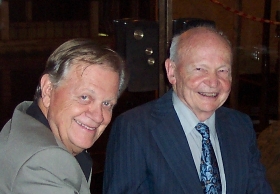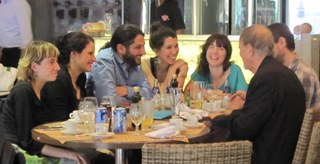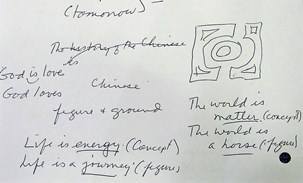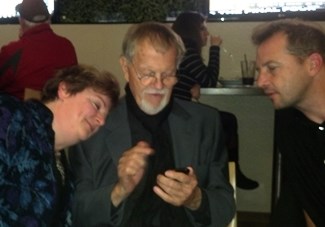Welcome To ICHTH
Hayden White (1928-2018)
Hayden White, Berlin Notes
The nice thing about this kind of occasion is that it gives one an opportunity—at an advanced age—to offer excuses for one's sins-- both of commission and omission committed over the course of a career.
So here goes. I began my career as a scholar of medieval history and enjoyed the antiquarian experience of years in Rome and Florence imbibing the melancholic atmosphere of days spent dreaming in ancient churches and monasteries, ruined castles and fortified cities of days gone by. And although I thought of myself as a wissenschaftler in the mode of MaxWeber and a scholar in the mode of Gerd Tellenbach, I was always aware that my interest in the past was more philosophical than scientific. My work on the history of the Church, Roman and Canon law, and the Gregorian Reform (Investiturstreit) was always done with an awareness of the extent to which "the past," this past, this medieval past was utterly alien to both my perception of reality and the values I tried to impart to my students in the classroom. Increasingly over the years my interest shifted from this past to those historians who had devoted their lives to its study.
My interest shifted from history to historiography and the modes of presentation (of Darstellung) which the great writers of history—Michelet, Ranke, Burckhardt, Mommsen, and, yes, Marx, Guizot, Gebhart, Spengler, and Egon Friedell, employed in bringing this past to life, endowing it with vivacity and color, making it real, in the manner of Jan Huizinga, the great Dutch scholar who lured me into medieval history in the first place.
So in the first ten years of my career, I lived a double life, writing and teaching "history," on the one side, and pondering the mystery of historiography, the writing of history, how persons could be made into characters, events into drama, facts into reality, on the other. Ultimately, I came to think that historiography was, as its very name implied, a species of the genus writing and that the secret of its fascination since Herodotus and Thucydides on down to Huizinga, Mommsen, Tawney, Croce, and Beard lay, lay first of all and fundamentally, in its status as a kind of writing.
By the time I turned to composing a history of historical writing, I found myself in an academic atmosphere being revolutionized by new theories of writing, inscription, figuration, textuality, linguistics, semiotics, and an idea of "literature" revolutionized by attention to the great masters of literary modernism, an idea of literature as "writing": Henry James, Joseph Conrad, Virginia Woolf, James Joyce, Marcel Proust Gertrude Stein, Thomas Mann, T. S. Eliot, Ezra Pound, and a host of others. For these writers the older distinctions between poetry and prose, literal and figurative, rhetoric and logic, Sinn und Bedeutung, and even fiction and fact did not line up easily with Aristotle's idea of the relation between poetry and history, the doxa which had reigned as dogma in thought about history until very recently.
So, I came to think, if one were going to compose a history of historical writing (or writing about history), one had to begin by conceptualizing it in terms consonant with current thought about writing. And this resulted in a book, Metahistory: The Historical Imagination in 19th century Europe, which was generally received by professional historians as wanting in a proper content (the research dimension of historical inquiry) and a proper form (abstract ideas, etc.).
What was not perceived even by me at the time was the simple idea that in historical writing, as in writing in general, the form of the presentation was an element of the content as well. It was not quite a matter of the medium being the message but rather that the medium was certainly part of the message if not the most important part, even in scholarly or scientific discourse. Indeed, the implication was—and I think still is—that the modernist notion of writing permits an understanding of ideology more as a matter of the form of the presentation (die Darstellung) than of the so-called content or referent thereof. And this is what got me involved in the then emerging question of the epistemic and ontological status of narrative (narration, storytelling) as a form, genus, or mode of writing adequate to the representation of that way of being in the world called historistic, historiological, historiosophic, or simply "history."
As thus envisaged, any written presentation of a past reality in the manner of a narrative had to be viewed as a product of an imposition upon "data" of a form more mythological or mythologizing, poetic or literary, than scientific or mimetic. Any putatively realistic representation of past reality—the actual existence of which was attested by "evidence" of a particular kind—had to be grasped as a construction rather than as an image or congeries of propositions that was true by virtue of its correspondence to "the facts" of that reality. A theoretically justified defense of narrativity as a mode or genus of representation of a putatively "given" set of real events had to take account of modernist notions of "writing" (écriture, Schriften, scrittura, and so on) if one wanted to maintain that historical writing was anything other than a fictionalization (or aestheticization) of a world truthfully presentable only in scientific metalanguage or educated common sense.
(The notes fom which Hayden White spoke at Berlin where he was granted
an honorary doctorate from Freie Universität Berlin (June 9, 2015) - fragment.
The passing of Hayden has affected us all in different ways. We are all aware of his huge contributions to historical thinking. Almost single-handedly in the US at least, he put on the table some of the most fundamental issues of historical writing, and did this long before the self-reflexive turn - in the humanistic sciences - of the late nineteen eighties and the nineteen nineties. It upset a lot of people but also brought him many admirers in the end. The intellectual impact of his writings was undeniable whether one agreed with him or every point or not. Many of his books will not be forgotten. I also remember most vividly his personality as it came through to me from the few meetings I was fortunate enough to have with him - he emanated intelligence, large-heartedness, goodness, and affection towards fellow humans.
Dipesh Chakrabarty
(The University of Chicago, USA)
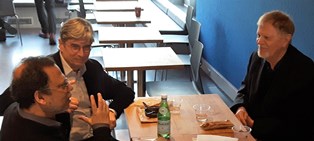
Hayden White thought me how to be myself and how to be free in my thoughts. I deeply cherish not only his knowledge, but especially wisdom. I found a very moving – especially in the present context - message, that Hayden have sent me in July 2014 where he wrote: "On the morning of my birthday, Margaret asked me if I had any thoughts, It was strange because during the night I had had a dream in which, looking over my life as I approach the end, I had the feeling that only one question really mattered to me: 'Did I give enough?' I am more and more of the conviction that we fail more by what we do not do than by what we do. Sins of omission rather than commission." My deepest condolences to Hayden's family.
Ewa Domanska
(Adam Mickiewicz University in Poznan, Poland)
I'm deeply affected by the message that Hayden White passed away. Since the 1990s his name, his writings, his attitudes were present in our everyday readings, talks, teaching even in polemic debates. And indeed the representation of Hayden White in the historians' community and deeds was multifaceted and many-sided.
Hayden was particularly generous with our review "Historein" and the people of "Historein". He came in Athens twice and he published in "Historein" three articles and an interview.
I remember him, when first came in Athens in 1999, following a street demonstration instead to visit Acropolis. "Monuments will be there also when I'm coming anew in Athens", told me. "But street-protests, who know whether will take place!" His mind was so proliferous and penetrating in any aspect where the personal was linked with the social and the present with the past. He was not a historical theory maker, but a philosopher asking simple questions regarding our relations with history and the past, the ways of perceiving it and talking about it.
Hayden grew older becoming younger. That's why the profound surprise knowing that he will not be any more with us.
We prepare a text in memoriam for the next issue of Historein.
Antonis Liakos
(University of Athens, Greece)
When I received the message that Hayden has passed away it felt like a shock, although I should of course have expected it at some point in time. Hayden has lived a very long and very full life in which he was an inspiring colleague and friend for many who had the good fortune of meeting him occasionally. Although my views on several key issues in historical theory were critical of Hayden's, he always remained open, interested in and somehow playful towards me during the many meetings where we both were present over the years. He had the rare talent to keep on reading and developing new ideas even in his old age - so intellectually he enjoyed an eternal youth. At the same time it was always clear that although he lived his professional life as an acclaimed academic, he never swapped the professional for the whole person. I will miss Hayden both as an inspiring colleague and as an emphatic person with whom it was always good to share a glass, a laugh and a conversation
Chris Lorenz
Ruhr University Bochum, Inst. of Social Movements
It takes time to accept the idea that Hayden White is not anymore among us. To my regret, I haven't had chance to meet him in person, but I have lived for years in the company of his writings and made available some of them in Estonian. I'm also proud that I was the first one to write an article on his work for the Estonian audience in 2003. I find it very symbolic that a few months ago I planned to have a graduate seminar on Hayden White's work on 9 March at a 2 pm. The seminar will start in 10 minutes and needless to say, it will be dedicated to the memory of this great historical thinker whose memorial service is held today.
Marek Tamm
(Tallinn University, Estonia)
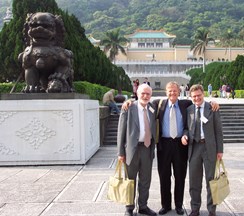
I am really sad that Hayden passed away. He has been a tremendously important person to all of us. he was idealistic and pragmatic at the same time and this rare combination made him a unique personality. His creativity was unparalleled and very inspiring. He was particularly generous with me allowing a selection of his essays to be published by an Italian publisher for free. When he gave a seminar at my department, it took him no more than half hour to become the darling of everybody, from students to the dean to the barista. A memorable and endearing personality.
Edoardo Tortarolo
(University of Eastern Piedmont, Turin, Italy)
I woke up two days ago with the sad news of the passing of Hayden White. The words written at this moment cost me a lot, although, on the other hand, Hayden's words go through my own academic writing. I bet today that no one would question the erudition, originality and intellectual audacity of this great philosopher of history. But for his discipuli and colleagues, the absence of Hayden means the loss of a great reader not only for having provided us with clues to read history with the guide of his notions of tropology, figural realism or practical past, as well as not only because his works are living libraries, encouraging us to read the classics under a new magnifying glass, but above all because Whitean readings are of immense generosity. Those writers read by Hayden's eyes are elevated, thanks to this reading, to the category of great classics. His tropological readings did not seek to discredit or delegitimize those authors who wrote about the past, but rather to illuminate the multiple, rich and not always docile tools that made those writings on disputed past possible.
Veronica Tozzi
(Universidad de Buenos Aires, Argentina)
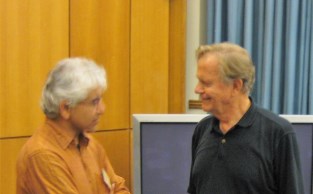
Hayden was an amazing scholar and a charismatic and generous person. I came to know him a little in the last 10years or so. My favorite memory of him is of being with him and others at a workshop in Sofia, Bulgaria. One day we went out for lunch. Hayden had read about some restaurant that he wanted us all to go to. We wandered around unsuccessfully for a while, with people much younger than Hayden getting tired and ready to give up. But not Hayden - already in his 80s, he bounded around with undiminished enthusiasm and energy, and eventually found the place in question. That is how I will remember him- not only as a great mind, but as an irrepressible spirit. My condolences to his family.
Sanjay Seth
(University of London, England)
We deeply and sincerely express our profound condolence to Haydan's passing. He is not only our dear friend. He is so popular in China, especially in the academic area, among historians. His main books are translated into Chinese. We are very happy that we have met with him for several times during the ICHTH meetings. He will always live in our minds.
Chen Qineng, Jiang Peng
(Chinese Academy of Social Sciences, China)
I join you to express my profound condolences for Hayden's passing. He was such a towering figure in the field of historical theory, not only in the English-speaking communities but also around the world, as many of his works have appeared in several languages. For the past few days, I have seen a number of publications in China that pay tributes to Hayden's legacy. I myself also wrote a piece that recalls my association with him which was published and widely circulated there too. I have such a fond memory of accompanying him to visit many institutions around East Asia. His wisdom, charm, eloquence and, of course, his groundbreaking contribution to the development of historical thinking in our times, will be dearly missed by all of us who have the fortune to have acquainted him.
Q. Edward Wang
(Rowan University, USA)
The passing of Hayen White is a devastating loss both personally and professionally. Hayden was a force unto himself and a source of intellectual energy and vitality for others. His work for the journal History and Theory was indefatigable whether he was writing to suggest books to review, bringing authors and scholars to our attention, or reading manuscripts at our request. He always had time for us and he always wanted us to push the limits of what we aspired to do. His last official e-mail to the journal was a response to our request that he evaluate a submission. He declined, uncharacteristically, which was surely a sign that his energy had diminished but he also sent me a note that the article "looked like a winner," a sign that he read it nonetheless. Nothing could stop Hayden or so it seemed and thus the news of his passing was a tremendous shock. I will miss his demanding inquisitive emails, his sharp wit, his kind demeanor, but most of all I will miss his encouragement. Hayden gave me confidence and for this I am eternally grateful but now I am also incredibly sad. I miss him very much already. I'd like to indulge in one anecdote. Hayden and I were members of a book panel at UC Berkeley on Eelco Runia's Moved by the Past. During my presentation I mentioned Chladenius and Hayden interjected that is was absurd of me to expect a room full of undergraduates to know what I was talking about. "So what about Chladenius? You can't just drop Chladenius on them" he said. He was surely right. But on my ride to the airport I was talking with the driver and discovered that he would be taking Hayden and Margaret to Santa Cruz later that day, and also that he liked practical jokes. I told him to introduce himself to Hayden as "Johannes Chladenius" and he said he would. The next day I received this message, "Strange coincidence: our limo driver turned out to have the name Johannes Chladenius. So: 'What about Chladenius?' Nice seeing you. More later. Hayden." I don't know why I felt compelled to share it, I suppose because there will be no more. Farewell Hayden.
Ethan Kleinberg
(Wesleyan University)
The Hayden V. White
Endowed Chair
in Historical and Cultural Theory
at UC/Santa Cruz
(fundraising)
Richard Vann
Hayden WhiteHayden White has been for more than thirty years a towering figure in the humanities—history, literature, and literature—in North America and Europe. He has found a new connection between historical writing and historical thought, and has pioneered the treatment of histories as literary artifacts. His theory of tropology is a remarkable innovation with implications for all of the humanities.
With his first major work, Metahistory: The Historical Imagination in Nineteenth-Century Europe (1973), White created what might be called "historiology"—the study of the structure of historical texts. It bears the same relationship to historical writing as literary criticism does to literature. Historians and literary critics had of course often discussed the "styles" of historical writers, but usually contented themselves with remarks which remained at the lexical level. White introduced a far more searching and complex set of analytical tools, which encompassed not just the types of argument that historians employ in making explanations—the province of traditional analytical philosophy of history—but also the varieties of ideology which inevitably inform their work, the literary genres employed in their narratives, and, at the deepest level, the four tropes which, since the Renaissance, have been used to analyze all kinds of discursive prose.
Having laid out this framework, White uses it to discuss historical thought in the nineteenth century as exemplified by four "master historians" (Michelet, Ranke, Tocqueville, and Burckhardt) and four philosophers (Hegel, Marx, Nietzsche, and Croce). His most fruitful and original , if controversial, theory is that of the tropes, which he has extended in later writing to interpreting Freud's Interpretation of Dreams, Proust's À la recherche du temps perdu and even to musicology. If it had done no more than offer new and imaginative readings of these figures, Metahistory would have been noteworthy but hardly path-breaking. It would not have had the influence testified to by the sale of more than fifty thousand copies and translation into most of the major European languages; nor would it have attracted the attention of hundreds of literary historians and critics. What accounts for its wide appeal and influence is that it offers to the historian of historical writing a formal basis for comparison of past historians; to the literary critic a template for analyzing narratives of all kinds. At the same time it is an open and even fluid theory (White leaves it unresolved whether tropes are merely conventional in the Western tradition for the production and analysis of "discourse in general," or whether they are grounded in the unconscious such as to constitute "laws of thought").
This openness characterizes all White's subsequent writing. Rather than attempting to impose a structuralist doctrine or dogma, he has readily questioned his own concepts, granting that Metahistory was excessively schematic. His collections of essays which have appeared since the publication of Metahistory offer refinements of it and treatments of contemporary thinkers from Ricoeur to Derrida. Along with his remarkable skill at analyzing historical and other sorts of narrative he has consistently pointed out how narrative was and is implicated in the operations of state power—which, for White, is seldom benign.These later essays have been complemented by many occasional pieces, characterized by generosity in comment but not devoid of criticism. White has become something of a public intellectual with a number of disciplinary publics and an international audience, as is shown by his invitations to teach in various places around the world.
White's professional and public life are grounded in a commitment to expanding human freedom. Just as he treats his own work lightly, avoiding self-justifications or expositions of what it "meant," so he has no "school" or group of disciples—certainly not his graduate students. His is an existentialist humanism, inviting—and occasionally goading—his readers into taking responsibility for their moral decisions, rather than claim that they are mandated by parts of the historical record or required by some scientistic ideology.
Ewa Domanska on Hayden White
In recognition of his work, in 1991 White was appointed a member of the American Academy of Art and Sciences, and in 1995 was awarded an honorary doctorate by the University of Michigan "for his scholarly work to unite historiography and literary criticism into a broader reflection on narrative and cultural understanding." (The idea came from the school's historians, who previously excluded White from their ranks). Although White retired in 1996, he has continued to publish and teach courses, e.g. the theory of the text in the Department of Comparative Literature at Stanford University. Since the mid-1990s, such concepts as figura, completion, kairos, crisis, catastrophe, change (considered in the context of identity, memory, metamorphosis and transsubstantiation), and utopia have acquired greater prominence in his vocabulary. His interest in Auerbach's concept of the figura, observable already in The Content of the Form, has taken a new direction. Arguably, in White's conception of discourse "figural creationism" has become an alternative to "tropal evolutionism."
In White's recent work, the figura has become the basis for a new paradigm of thinking, the site of fulfillment for his metaphysical longings, the locus of ethics. White's sustained interest in Freudian and Lacanian psychoanalysis has given the concept new interpretive potential. The figura is conceived as a fissure, a wound marking the passage from the conscious to the unconscious in discourse, while figural space is the unconscious of discourse. Following Freud, White seems to look for a foundation in what has been repressed and excluded from discourse but finds a manifestation in the figurae. In White view, today's theory of history needs to recognize the fact that because historical knowledge is always post-factum, its causality can only work backwards.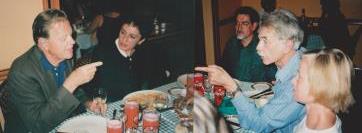
White's alternative to traditional logical causality is figural causality, which assumes that what we regard as the past is actually a product of future-oriented thinking. After White there is no more history beyond history, but there is the open past, which exists as the burden of existential experience.
In recent years, White has often spoken of the "practical past" (or usable past), a concept borrowed from Michael Oakshott which refers to the past as used by individuals, groups and institutions in their practical actions, both in everyday decision-making and in extreme situations.Yet again, White emphasizes the complex ramifications of the fact that history, so often perceived as transparent, is a particular way of approaching the past typical of Western culture. Consequently, it is burdened with the features of that culture, which have manifested themselves in historiography since the nineteenth century as elitism, classism, racism, and science. History, in White's view, has a similar tendency to universalism as Christianity and capitalism, and hence should not be conceived as objective knowledge about the past or its unbiased representation, but as ideology serving the dominant power. "History was always ideological," White argues, adding that "It is not a bad thing. Better a right wing ideology than none at all. Ideology at least shows that you are interested in the present and future." The question of the uses of history and literature (and the related critical theory) is a recurrent motif in White's work, since, as he declares, "what is the point of our knowledge if we do not try to apply it to our lives"?The Practical Past. Historein, vol. 10, 2010.
The Future of Utopia in History, vol. 2, 2007.
On the research and the writing phase of the historian's work. Historein, vol. 14, no. 1, 2014.
Hayden White in History and Theory - Free Virtual Issue
Syllabus CL
Hayden White
Comp. Lit. 300 Theory of the TextClass meetings: 3:15 p.m.
Bldg 460, Room 301
Email address for Prof.White:
Hwhite2736@aol.comThe purpose of this course is to assess the utility of various theories of textuality that have appeared in the wake of certain new sciences of language and discourse over the past half century. During the course of the term, we will consider various textualist approaches to the questions of genre, mode, narrative, referentiality, subjectivity, and so on.
In addition to studying various theoretical essays dealing with formalist, existentialist, structuralist, post-structuralist, hermeneutical, and new-historicist approaches to "text," we will concentrate on the genres of modern(ist) biography, autobiography, memoir, and testimony. We will investigate the problem of representing events so unusual or unanticipated as to seem unrepresentable"—events such as the Holocaust, genocide, total war, and industrial disaster. How to represent the unrepresentable—that is the question.
Texts for the course will be five memoirs/autobiographies/testimonies and one book of readings on witness literature:Primo Levi, Survival in Auschwitz: The Nazi Assault on Humanity. New York: Collier, 1993. 0-02-029292-2. Eng. translation of Se questo č un uomo (1947, 1958)
Roland Barthes, Roland Barthes by Roland Barthes. Berkeley: Univ, Calif. Press, 1994. 0-520-08783-6. Eng. translation of Roland Barthes par Romand Barthes (1975)
Rigoberta Menchu, I, Rigoberta Menchu. London- New York: Verso, 1998. 0-86091-788-6. Eng. translation of Me llamo Rigoberta Menchú y asi me nació la conciencia. 1983
Grass, Günter, My Century New York: Harvest Book, 1999. 0-15-601141-7. Eng. translation of Mein Jahrhundert, 1999.
Binjamin Wilkomirsi, Fragments. Eng. translation of Bruchstücke: Aus einer Kindheit 1939-1948. 1995. In Stefan Maechler, The Wilkomirski Affair. New York: Schocken, 1996. 08052-1135-7.
Ana Douglass and Thomas Vogler, eds., Witness and Memory: The Discourse of Trauma. New York/London: Rouledge, 2003. 0-415-94454-4 [This will be our official "textbook."]
I will provide photocopies of portions of the these texts in their original languages: Italian, French, German, Spanish. I urge those of you who know well one or another of these languages to work on texts in the original languages so that the class can draw upon your expertise for guidance in reading the literal or surface levels of them.
Requirements:
Attendance: I expect regular attendance at the seminar meetings and will reduce the grade by 5% for each unexcused absence.
Assignments:
Oral presentation on some aspect of the assigned reading, a fifteen-minute introduction and discussion of one of the assigned texts of a given day. This is not a research paper. Worth 20% of the grade.Writing:
Book Review: We do not have a great deal of time in what is essentially a nine week term, and I want to get a handle on how you write as soon as possible. So please turn in a book review on one or another of the books being used in the class—ideally, a book written in a language other than English in which you can work comfortably--by January 27. (Suggestion: Look up some reviews of the book in question and see if you can find a model review that might be used as a pattern for your own essay.) This review should be at least one thousand words long (roughly four, double-spaced pages). This report will be worth 20% of the grade.
Term paper: Finally, I request a longish final paper, of approximately 4,000 words (not including bibliography or footnotes), which analyzes one or two texts of the autobiography /memoir/ witness genre utilizing some notions of the theory of textualism as outlined in Roland Barthes' essay, "The Theory of the Text" (in Robert Young, ed., Untying the Text: A Post-Structuralist Reader [London: Routledge, 1981)—photocopy of this text will be passed out at the first meeting. This paper will count for 60% of the grade.
Reading Assignments.
The reading assignments will consist of the six texts required for the course plus various essays of theory and criticism which I will distribute over the course of the term.
The principal aim of the reading is to introduce you to five representative works of "witnessing" of the late 20th century. I want to work towards a distinction between ordinary and literary accounts of extreme events such as the Holocaust, genocide, massive industrial disaster, and the like. So I would like you to start reading (scanning, if that is all you have time for) all five texts required for the course, and finish the first read-through of these texts as quickly as possible. These texts will be drawn upon for discussions of the principal topics associated with "the theory of the text." I will presume general acquaintance with all five of these texts in the discussions of the topics.What are the principal topics?
Discourse (and discursivity) and its modes
The difference between a "work" and a "text"
The referent(s) of discourse: found and invented
Action (agency) and passion (patiency)
The event and the trauma
Narrativization and descriptivization
Subjectivity and subjection
Ideologization and autonomyAs you can see, these are rather abstract terms set up in a relation of "disjunctive conjunction" (not necessarily as oppositions). We will examine this kind of relationship as a basis of discursivity.
The reading will be divided into three three-week units:
Thus, for the period January 13 - 27, we will read the following:
Barthes, "Theory of the Text" (handout)
Ricoeur, "The Model of the Text" (handout)
Jameson, "The Ideology of the Text "(handout)Barthes, Barthes by Barthes
Levi, Survival in AuschwitzDouglass and Vogler, eds., Witness and Memory, Introduction & Vogler, "Poetic Witness."
Please read Barthes (both the "Theory of the Text" and Barthes by Barthes) first, then Levi entire, while beginning Ricoeur, Jameson, and Douglass & Vogler.
More to follow . . . . .
Michael S. Roth on Hayden White
Frankfurter Allgemeine Zeitung Obituary
Scott McLemee, Hayden White's Perplexing History
Amy J. Elias, The Voices of Hayden White
Interview with Jörn Rüsen on the death of Hayden White
Gary A. Patton, Hayden White and the Winds Of Freedom
Robert Parkes, The Practical Legacy of Hayden White
Ethan Kleinberg, Hayden White. In Memoriam
Karyn Ball, Ewa Domańska, “Hayden White,” in: Oxford Bibliographies ( 2019).
The Archives of Hayden V. White (UCSC)
